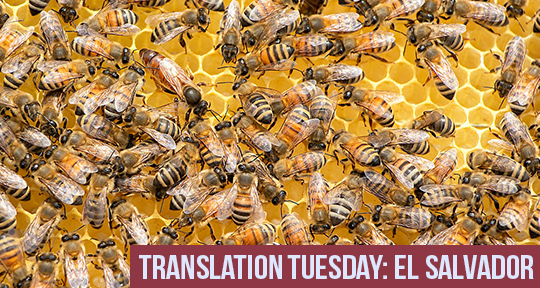This Translation Tuesday, time acts as the grand cipher that the Salvadoran poet Lauri García Dueñas seeks to decode from its twenty-first century entanglements. Originally published by Proyecto Literal in 2012 (one of the forerunners in promoting experimental works from Latin America today), these three poems from Time is a Cryptic Text begin with simple propositions about time’s essence and nature. But as they churn on, the poems’ words shudder like atoms trying to break loose from their bonds with each other, and time turns out to be completely polluted and punctured by the social and political world. Olivia Lott’s translation brims with this accelerated energy; each poem, like a movement in a grand symphony, contains its own music and cacophony.
“As García Dueñas’s title indicates, the book’s fifty-two poems (or single poem in fifty-two parts) departs from an obsession with time as a conventionally unquestioned organizer of existence. Through avant-garde formal devices––like stream of consciousness, relentless enjambment, and the absolute defiance of capitalization and punctuation––the texts seek their own encryption, asking the reader to look between the cracks. There, they’ll find many things: from an x-ray deconstruction of Mexico City (where García Dueñas lived for several years) to a love poem that doesn’t want to be one. In translating these poems, I have privileged their rhythm, opting for a sped-up English to match their urgent political drive and to keep the poetic experiment front and center. This is especially important, I think, when translating a writer from El Salvador, given the expectations for neo-realism and testimony historically placed on Central American writers—not to mention the exclusion of the region’s avant-gardes from both Latin Americanist and comparative conversations. Time is a Cryptic Text is both politically committed and formally innovative.”
—Olivia Lott
2
time is also nervation african bees searching their honeycomb for death this frenetic pleasure of parallelepiped writing uninterrupted this dark swollen-cheek sun the wind lacan flipping through books in the gandhi on miguel ángel de quevedo the telephone rrring sounds like a naked body two naked bodies thorns fish gliding on the sidewalk pedestrians walking over the fish the young musician yelling out to people to please stop stepping on the fish you’re hurting them but people never understand anything the fish are the foundation of this lacustrine city sky turned to water madness tip of the scar i spread infected words not one period instead of the other you’re not real i can’t find the syllables or the start of the nervation it means nothing i walk fast a type of solitude burrows a nest in me nothing touches the ground i don’t want anything from you i say it again i’m not convinced i’m always late peach flowers intersect the eyes of other eyes petals time grinds its teeth when it sleeps the young musician builds spaces to live in sounds of bold colors it all escapes our own volition but i want to play with death and yell burn burn i’m peeling you off of me you’re hurting me phrases in the darkness time isn’t real (i don’t think it is) READ MORE…


